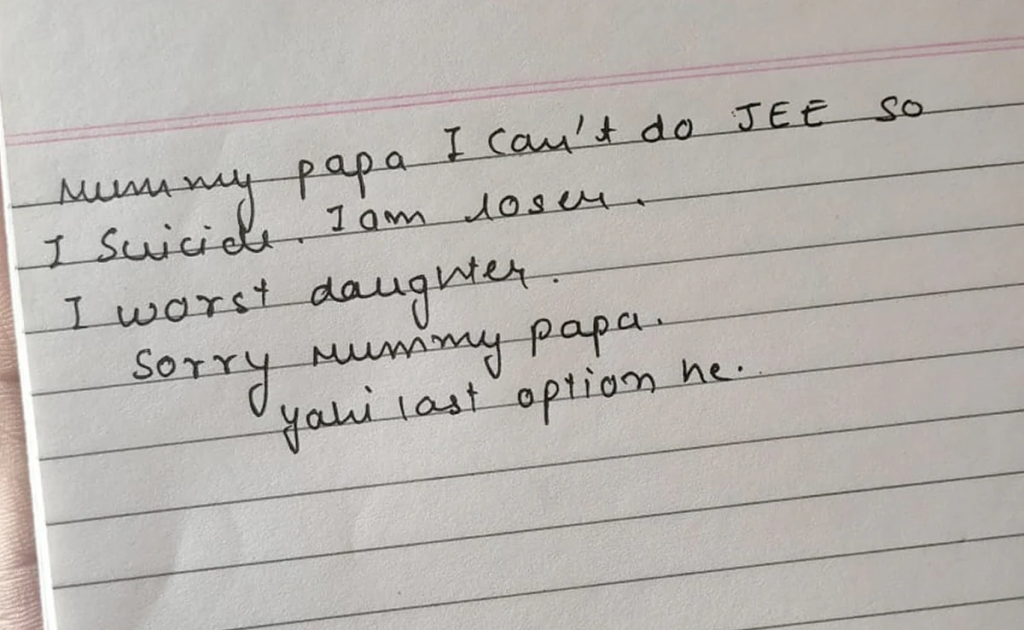Examining the Ongoing Crisis
Examining-Introduction:
Examining-In a tragic turn of events, the recent suicide of Niharika, a 12th-grade student residing in Kota with her father, a bank employee, sheds light on the pressing issues faced by coaching students. Niharika’s struggle with the intense pressure of competitive exams, despite dedicating seven to eight hours to daily studies, highlights the profound challenges these students encounter. This heartbreaking incident closely follows the suicide of Mohammed Zaid, another coaching student in Kota, who was preparing for the NEET entrance examination.

Examining-Addressing the Crisis:
Examining-Last year, the surge in student suicides prompted the Central government to issue guidelines aimed at mitigating the pressure on coaching students. However, the effectiveness of these measures remains a matter of debate, with experts and stakeholders expressing concerns about the need for more comprehensive solutions.
Examining-Challenges Faced by Coaching Students:
Examining-Dr. Bharat Singh Shekhawat, the head of the psychiatry department at Kota Medical College, emphasized the necessity of a comprehensive overhaul in the approach of both coaching institutes and parents to address the alarming rise in student suicides. He pointed out that students admitted to coaching institutes at the age of 15 or 16 miss out on the benefits of traditional schooling, including extracurricular activities and friendships. Moreover, the rigorous coaching schedules expose them to significant stress, contributing to their mental health challenges.
Examining-The Role of Coaching Institutes:
Examining-Kota, known as an educational hub, attracts over 2 lakh students annually, seeking preparation for exams like JEE and NEET. The city is home to numerous coaching institutes that promise success in these highly competitive exams. However, the intense competition, coupled with the demanding study schedules, has raised questions about the impact on students’ mental well-being.
Experts argue that coaching institutes need to reassess their approach, considering the psychological toll on students. Balancing rigorous academic training with mental health support systems, such as counseling services and stress management programs, is essential to create a more conducive learning environment.
Parental Involvement and Support:
Parents also play a crucial role in shaping the mental well-being of their children. The pressure to excel in exams often comes from familial expectations, leading to added stress on students. Dr. Shekhawat stressed the importance of parents understanding the psychological needs of their children and providing emotional support. A balanced approach that recognizes the significance of both academic success and mental health is essential for a student’s overall development.
The Impact of Early Admission:
One key aspect highlighted by experts is the age at which students are admitted to coaching institutes. Dr. Shekhawat pointed out that students admitted at the age of 15 or 16 are too young, missing out on the holistic development offered by traditional schooling. The absence of extracurricular activities and friendships can contribute to feelings of isolation and loneliness, exacerbating the stress induced by the demanding coaching schedules.
The Need for Holistic Education:
To address the rising concerns surrounding student suicides in coaching hubs like Kota, there is a growing call for a more holistic approach to education. This includes integrating extracurricular activities into the curriculum, promoting a healthy work-life balance, and incorporating mental health education into the overall learning experience. The focus should shift from solely academic achievements to the overall well-being of students.
Government Initiatives and Their Impact:
While the government has taken steps to address the mental health challenges faced by coaching students, the effectiveness of these initiatives remains a subject of scrutiny. It is essential to evaluate the implementation of guidelines issued to coaching institutes and district administrations and identify areas that may require additional attention and resources.
Conclusion:
The suicides of Niharika and Mohammed Zaid highlight the urgent need to reassess the approach to coaching in India, particularly in cities like Kota. The mental health challenges faced by coaching students demand a comprehensive response from educational institutions, parents, and policymakers alike. By addressing the root causes, such as early admission, intense competition, and lack of holistic development, it is possible to create an educational environment that fosters academic success without compromising the mental well-being of students. The collective efforts of all stakeholders are crucial to prevent further tragedies and ensure a more balanced and supportive learning experience for the aspiring youth of the nation.
